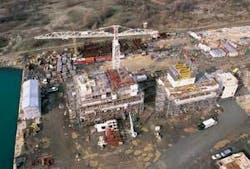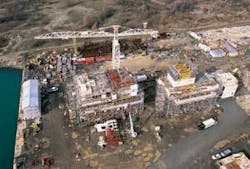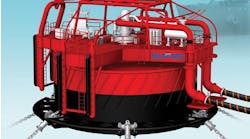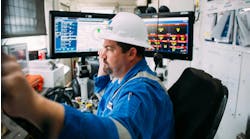First large-scale retrofit off West Africa
null
Despite a slow start, construction of the processing modules for Total’s Rosa/Lirio development off Angola is on track. Four of the six modules, under assembly at Eiffel’s yard in southern France, will be loaded-out as scheduled in mid-August.
Eiffel was awarded this package at the end of 2004, under a subcontract from Ponticelli, the contractor responsible for hook-up of the modules to Total’s Girassol FPSO. The other two modules are being fabricated by Sonamet in Angola. Detailed engineering has been handled by Pau-based Sofresid, which was also delegated by Total to procure the steel.
There were some problems early on with coordination, notably in connection with the drawings, but these have since been fully resolved. The initial specifications have been changed, leading to significant weight increases in three of Eiffel’s structures. The total weight of Module 1 (diesel generators), Module 2 (methanol pumps and filters), Module 3 (water treatment and re-injection) and Module 6 (high-pressure separation) is now 3,400 metric tons.
Girassol, which came onstream in deepwater block 17 in 2001, was at the time the world’s largest FPSO, capable of processing 250,000 b/d of oil. Rosa, the complex’s first subsea tieback, involves what may be the first large-scale topsides modification to a structure this size.
With so much daily production at stake, the construction schedule must be strictly respected to keep the hook-up operation as short as possible. “This has had a big impact on the design of our modules,” says Eiffel’s Offshore Division Director, Arnaud de Villepin.
“The modules are equipped with hingeable platforms and hook-up installation aids in order to minimize hot work onboard the FPSO. They will also be commissioned as much as possible at the work site to allow early start-up of Rosa.” Offshore work on this project started last September. Heerema’s crane bargeThialf will perform the installations, with the aid of a 120-ton temporary crawler crane onboard the FPSO. First oil is due at the end of this year.
Overhead view of Rosa/Lirio fabrication at Fos-sur-Mer.
Eiffel has mobilized 350 personnel for this project at its yard in Fos-sur-Mer. Assembly of the modules presented no major problem: the main difficulty lay in the protective coating, requested by Total, to guard against fire in the event of an explosion. “This coating, named PFP (passive-fire protection) is designed to increase the time before destruction sets in.
“When subjected to extreme heat,” de Villepin explains, “it expands, like foam. However, it is very complicated to apply, taking much longer than normal painting. Also, for maximum efficiency, it really needs to be applied directly after fabrication is completed.”
Eiffel erected a small building at the yard for this job, constantly maintained at a temperature of 15°C. For some pieces that could not be brought into the building, the surrounding fabrication area was closed off; the treated substructures were then covered in shrink wrapping, with a heater put in to maintained the applied coating at the correct temperature.
Eiffel also hopes to work with Ponticelli on a much larger West African project. The two companies are bidding for Total’s shallow water Ofon Phase 2 development offshore Nigeria, where the requirement is for one 12,000-metric ton production platform. Eiffel will also bid for two other packages: three wellhead jackets and associated bridge links, with a total weight of 7,000 tons, and one 140-man living quarters topsides. The main platform would be built at Fos, which has handled similar size structures in the past, most recently for the Cobo development offshore Angola.
Offshore Qatar, Eiffel is also bidding for Maersk’s Al Shaheen project in block 5. The package in question comprises six living quarters with jackets - if successful, a small part would be built in Fos, the remainder at a yard in the Emirates. “If we secure even one of these projects, Fos could be fully occupied for two years,” de Villepin says. The Ofon production platform would require a 1,500-strong team at peak; welders are at a premium at peak, but Eiffel has good contacts with specialists from Portugal, which it employed recently on the Millau suspension bridge construction project in south-west France.




